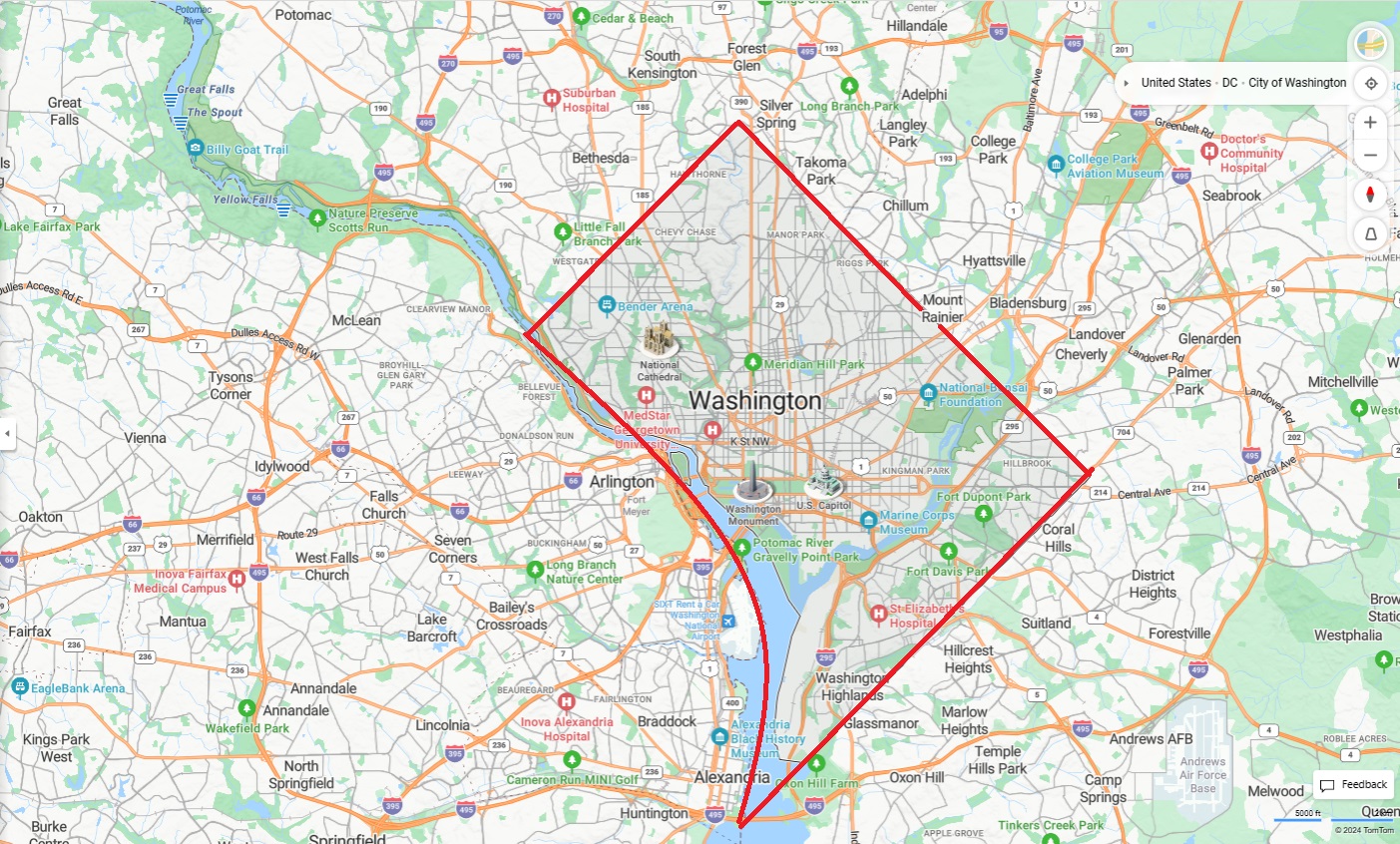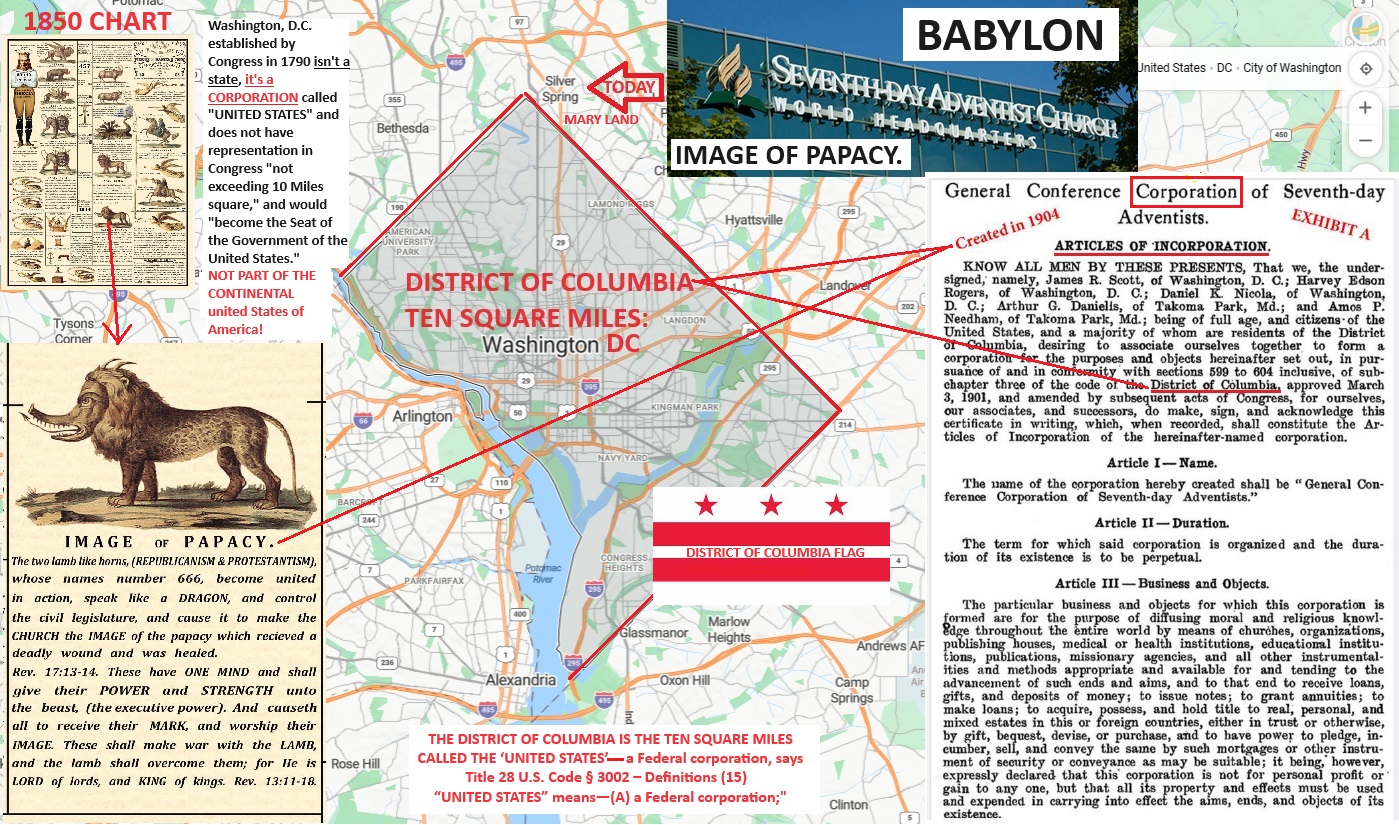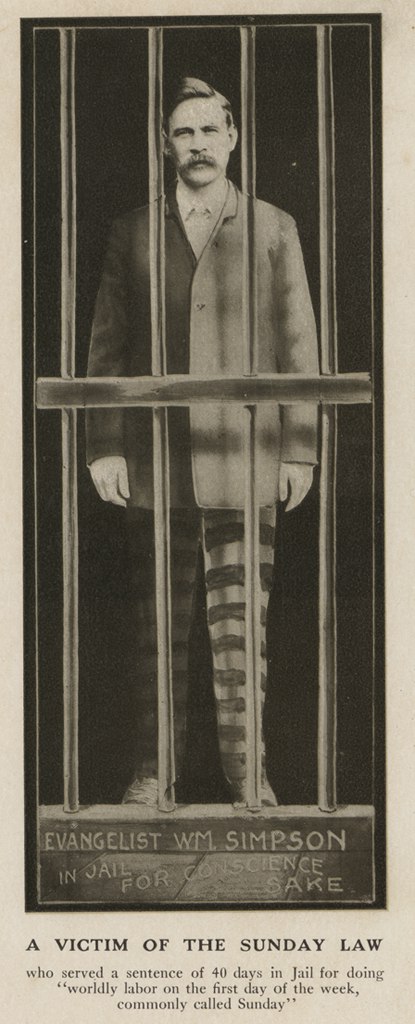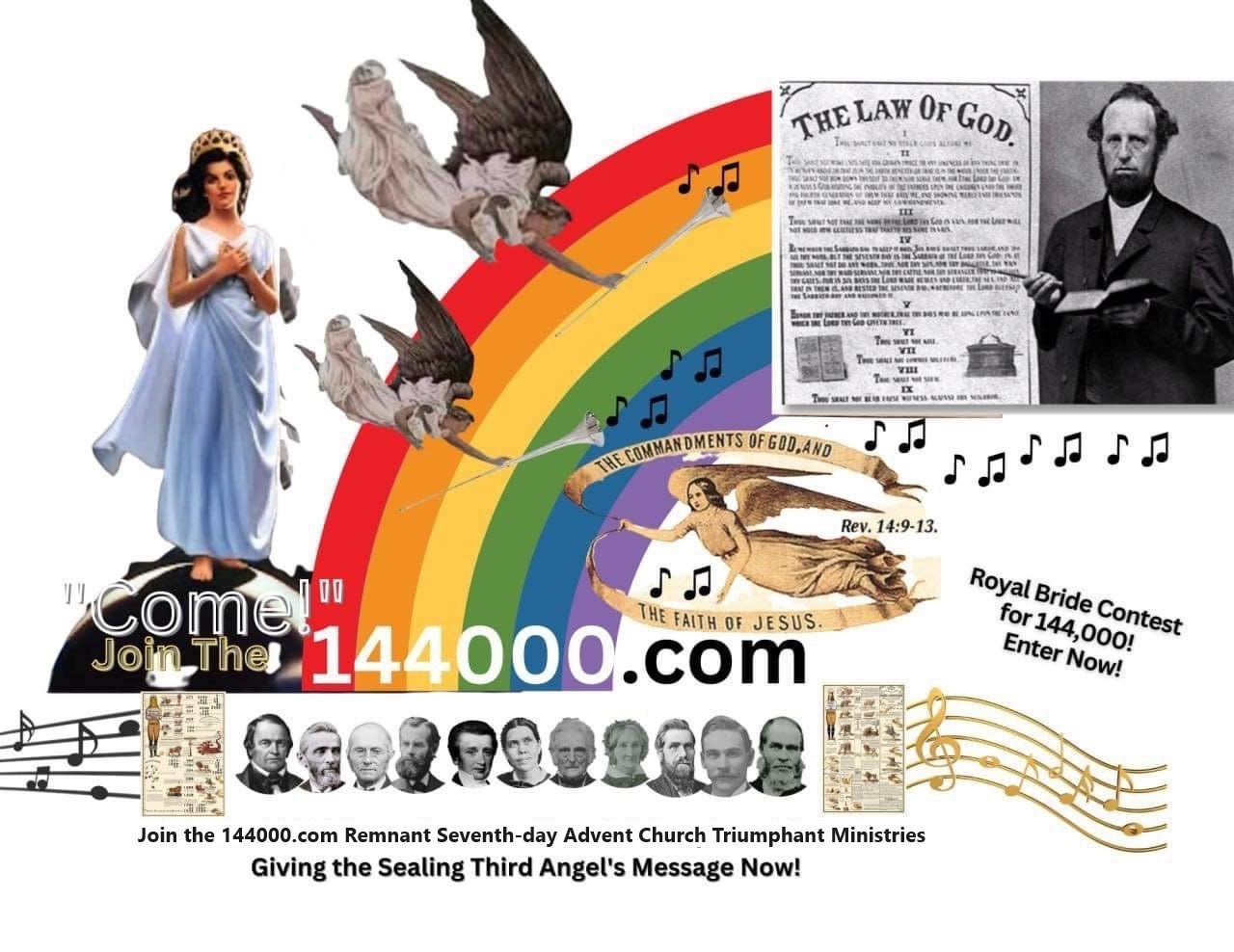American Patriotism and Protestantism in Chains Under the "UNITED STATES" District of Columbia Flag
(This Flag is the flag of the District of Columbia and is Washington, DC, Not More Than 10 Miles Square CORPORATION in NAME ONLY (not land/soil) called: "UNITED STATES")
The "DISTRICT OF COLUMBIA" IS the not more than ten square miles called the "UNITED STATES" - a Federal Corporation in name only, NOT a STATE, and NOT subject to Congress and is NOT the whole land/soil Americans think of as the united States of America, per Title 28 U.S. Code 3002 - "Definitions (15) "UNITIED STATES" means - (A) a Federal corporation;" Open U.S. Code Section 28/3002#15Take a look at this picture and see how the in name only "UNITED STATES" ties in to the where the "new organization" (1SM204) in NAME ONLY (nominal) (not the original Adventist group) General Conference Seventh Day Adventist Corporation STRUCTURE of the "new organization" (1SM204) was formed in 1904 in the "DISTRICT OF COLUMBIA"
not more than ten miles square "Federal Corporation" called "UNITED STATES":The FEDERAL CORPORATION "UNITED STATES" aka (also known as) the "DISTRICT OF COLUMBIA" aka "WASHINGTON, DC" not to exceed 10-Mile Square Boundary

"No church can be organized by man's invention [corporate structure in 1904 = "new organization" (1SM204)] but that it becomes Babylon the moment it is organized." Early SDA Protestant Pioneer (One of the 144,000), Elder George Storrs, The Midnight Cry, Februrary 15, 1844, P. 238.
 District of Columbia Ten Square Miles and the Image of the Papacy Formed In It in 1904
District of Columbia Ten Square Miles and the Image of the Papacy Formed In It in 1904
Relevant Constitutional Clauses
The relevant parts of the U.S. Constitution regarding the District of Columbia's lack of representation in Congress and its size limitation are found in Article I, Section 8, and the 23rd Amendment. Here are the specific excerpts:
Article I, Section 8, Clause 17
This clause gives Congress the power to exercise exclusive legislation over the District of Columbia and specifies the maximum size of the district.
"To exercise exclusive Legislation in all Cases whatsoever, over such District (not exceeding ten Miles square) as may, by Cession of particular States, and the Acceptance of Congress, become the Seat of the Government of the United States..." The "DISTRICT OF COLUMBIA" IS the not more than ten square miles called the "UNITED STATES" - a Federal Corporation in name only, NOT a STATE, and NOT subject to Congress and is NOT the whole land/soil Americans think of as the united States of America, per Title 28 U.S. Code 3002 - "Definitions (15) "UNITIED STATES" means - (A) a Federal corporation;" Open U.S. Code Section 28/3002#15Read more about Article I, Section 8, Clause 17
23rd Amendment
The 23rd Amendment, ratified in 1961, grants the District of Columbia electors in the Electoral College but does not provide for voting representation in Congress.
"The District constituting the seat of Government of the United States shall appoint in such manner as the Congress may direct: A number of electors of President and Vice President equal to the whole number of Senators and Representatives in Congress to which the District would be entitled if it were a State, but in no event more than the least populous State..."Read more about the 23rd Amendment
Lack of Representation
The Constitution does not explicitly state that the District of Columbia shall lack representation in Congress, but it has been interpreted this way because the District of Columbia (Washington, DC) is not a state and thus does not have voting Senators or Representatives. Instead, the District has a non-voting delegate in the House of Representatives.
Religious Persecution in Free America: The 1895 (Prior to 1904) Early SDA Protestant Adventists' Harrowing Story - A Forgotten Chapter of Injustice and Faith
On the evening of July 3, 1895, eight Seventh-day Adventists in Rhea County, Tennessee, were sent to prison. Court had adjourned until the following Monday, and the judge, attorney-general, and jurors had all gone home to celebrate Independence Day. However, the convicted Adventists' families had to bid them a sorrowful goodbye as they were taken to jail, their new home until the temporary workhouse for the chain-gang was ready.

The Injustice of the Chain-Gang
Upon reaching the prison, the sheriff registered their names and detailed descriptions to ensure they could be easily identified if they escaped. However, these eight Adventists had no thoughts of escape. They chose not to resist wrong and oppression, even at the cost of their freedom.
As they were being processed, one Adventist remarked with a touch of irony, "Sheriff, won't you please erect a liberty pole tomorrow where we can see it?" This poignant request highlighted the irony of celebrating National Independence Day while these men were imprisoned for worshiping God according to their consciences.
A Flag for Freedom
The flag, representing freedom and liberty, seemed a cruel mockery to these men who were punished for their religious beliefs. Under its folds, their forefathers had found the liberty to worship freely, a liberty now denied to them in "free America." The flag had become a symbol of the very oppression it was supposed to oppose.
"Thou art Freedom's child, Old Glory, Born of Freedom's high desire."
These men could look upon the flag and remember that it was meant to stand for the immortal Declaration of Independence and the Constitution of the United States. They could take solace in the knowledge that true religious rights are eternal and cannot be taken away by any government.
The Spirit of Liberty
The founders of the United States intended to create impassable barriers against religious bigotry and intolerance. Thomas Jefferson and James Madison were staunch advocates for the separation of church and state. Jefferson warned that rulers could become corrupt and that the people must remain vigilant to protect their rights.
"Besides, the spirit of the time may alter, will alter. Our rulers will become corrupt, our people careless. A single zealot may commence persecution, and better men be his victims." - Thomas Jefferson
Jefferson's words seem almost prophetic in light of the events in 1895. The spirit of the times had altered, and the persecution of Adventists was a stark example of this change. The Constitution and the Declaration of Independence had been undermined by those who were supposed to uphold them.
Persecution of "Inconvenient Citizens"
The Atlanta Constitution defended the persecution of Seventh-day Adventists, calling them "inconvenient citizens." The newspaper argued that the Adventists were problematic because they refused to work on their Sabbath (Saturday) and were thus considered troublemakers.
The Constitution's view was that religious matters were best left to the states. However, this stance ignored the protections offered by the First and Fourteenth Amendments to the U.S. Constitution, which guarantee freedom of religion and equal protection under the law.
A Call for Justice
The persecution of Adventists for their beliefs was a gross violation of their constitutional rights. The founders of the United States envisioned a nation where religious liberty was protected, and any laws infringing upon this liberty were inherently unjust.
Seventh-day Adventists, like many other religious groups, sought only the freedom to worship according to their consciences. They were willing to work on Sundays if required, but they would not compromise their Sabbath observance. Their plight highlighted the need for true religious freedom and the dangers of state-sponsored religious persecution.
Conclusion
In the end, the struggle of the Adventists in 1895 serves as a powerful reminder of the importance of religious freedom. The principles of liberty and justice, enshrined in the Declaration of Independence and the Constitution, must be upheld and protected. The Adventists' harrowing tale is a testament to the enduring fight for these fundamental rights in the face of oppression and injustice.
"And I heard another voice from heaven, saying, Come out of her, my people, that ye be not partakers of her sins, and that ye receive not of her plagues." - Revelation 18:4 (KJV)
"And at midnight there was a cry made, Behold, the bridegroom cometh; go ye out to meet him." - Matthew 25:6 (KJV)
ORIGINAL ARTICLE HERE:
American Patriotism: In the Chain-Gang Under the Flag
American Sentinel, September 5, 1895, pages 277-278
Reprinted by request from the SENTINEL of August 1.
The Evening of July 3, 1895
It was the evening of the third of July that the eight Seventh-day Adventists now in the chain-gang in Rhea County, Tenn. went to prison.
Court had adjourned until the following Monday, and the judge before whom they had been tried, the attorney-general who prosecuted them, and the jurors who found them guilty had all gone home to spend the Fourth—with their friends. But not so with the convicted Adventists. Their wives and children, a number of whom had been in court to hear the judge's sentence, had bidden them a sorrowful goodbye and had gone to their now lonely homes. Most of their friends who had been with them through the trial had also gone home and left them—prisoners.
It was then the sheriff said, "Come on," beckoning them to fall into line for the march to the jail, which was to be their prison until the temporary workhouse should be ready for the occupancy of—the chain-gang. A few moments sufficed to reach the prison, and then came the registration of their names with a detailed description of each man so that should they escape, they might be easily identified. But the eight Adventists had no thought of escape. They would not resist wrong and oppression even to the extent of seeking freedom in flight.
Patriotic Demonstrations
As the sheriff registered their names, some earnest of the patriotic demonstrations of the morrow—"the glorious Fourth"—attracted their attention and reminded them that it was the eve of the National Independence Day; and one of them said with a smile, and yet sadly and with just a touch of irony in his tone: "Sheriff, won't you please erect a liberty pole tomorrow where we can see it?"
A Liberty Pole and a Flag for Convicts?
Oh what a train of thought is started by that question! What! a liberty pole and a flag for convicts? What could "Old Glory," the "Star-Spangled Banner," the emblem of Freedom, the flag of both the State and the Nation mean to men who had violated the "law" of the land, who had braved the power which wears the flag? What comfort could chain-gang convicts, "law" breakers, possibly derive from looking upon the banner unfurled by the power that enslaves them—that power that brands them as enemies of the State and drives them to the stone pile with the vilest criminals, that locks them in loathsome cells or works them ten hours per day under a broiling sun for no other offense than worshiping God according to the dictates of their own consciences? In short, What is the flag of the Union to Seventh-day Adventists today?
Ah! thrilling memories cluster around that flag; for while Seventh-day Adventists have no taste for war or carnage, while they as followers of the Prince of Peace are opposed to war even as are the Quakers, they remember that it was in the providence of God that this land became an asylum for the oppressed of other lands; and they love the old flag because under its folds their forefathers found that liberty to worship which was denied them in the Old World and which is today denied Adventists in "free America;" not because of the flag nor of that for which it stands but in flagrant violation of the principles represented by every fiber of that noble banner; principles for which patriots died in 1776 and for which in this year of our Lord 1895 men toil in the chain-gang in Tennessee. And in the language of the poet these men can today look upon that flag and say—
"Thou art Freedom's child, Old Glory, Born of Freedom's high desire."
The Flag's Birth and the Declaration of Independence
The flag had its birth in the days of Washington and Jefferson and Madison and Patrick Henry; in the days when men knew the value of liberty because they had known what it was to be denied freedom of conscience; in the days when humble Quakers, patient Mennonites, noble Baptists and warmhearted Methodists and staunch Presbyterians alike claimed as an inalienable and God-given right freedom to worship their Creator according to the dictates of conscience and challenged the right of any man to dictate to them in matters of religion or in any manner to come between them and their God.
Those stars and stripes stand for the immortal Declaration of Independence and for that noble charter of liberty, the Constitution of the United States; not as perverted by the Supreme Court decision of February 29, 1892, but as it stood when our fathers had written into it: "Congress shall make no law respecting an establishment of religion or prohibiting the free exercise thereof." And just as men deprived of water love to think of "parting streams and crystal fountains," of rolling rivers and war-swept lakes, so Christian patriots, men who, living in all good conscience, render to Caesar the things that are Caesar's and to God the things that are God's, love to look upon the banner of civil liberty even though that which it represents has been denied them; yes even though their hearts bleed for the wrongs which they suffer and for the violence done to that freedom once cherished but now lightly esteemed by so many who know not its worth; for they know that religious rights are as lasting as the rock-ribbed hills or snow-capped mountains, yea that they are as eternal as the Everlasting King who gave them; that such rights "are not exercised in virtue of governmental indulgence but as rights of which government cannot deprive any portion of citizens however small;" and that though despotic power may invade those rights "justice still confirms them." And they with the poet can say:—
"Knaves have stolen thee, Old Glory, For their Babylonian lovers, From their festal walls and towers Droops the flag that then was ours; O'er their crimes thy beauty trails And the old-time answer fails When from chain-gangs, courts and jails Men appeal to thee, Old Glory."
Liberty and Injustice
The flag is not a god but in the providence of God it stands as the high water-mark of human liberty. But alas! as the sacred name of Christ has been made the cloak of most unchristian acts so this providential symbol of liberty has been made the covering for most revolting crimes against the most sacred rights of men. And as Madame Roland on her way to the guillotine bowed before the clay statue of Liberty erected in the Place de la Revolution exclaimed: "Liberty! Liberty! how many crimes are committed in thy name;" as Seventh-day Adventists can today raise the stars and stripes with these words: "O banner of liberty what crimes are committed under thy ample folds! what wrongs are done in thy name! what injustice and oppression is practiced by those who are sworn to maintain the principles by which thou wast begotten!"
"Corrupted freemen are the worst of slaves;" and we have fallen upon evil times when men know not what true liberty means. Some in the mad pursuit of wealth others in the fierce struggle for existence have forgotten that he who fails to protest against the persecution of his neighbor thereby virtually forfeits the right to protest when he is himself persecuted. Channing has well said: "The spirit of liberty is not merely as multitudes imagine a jealousy of our own particular rights but a respect for the rights of others and an unwillingness that any man whether high or low should be wronged."
The Purpose of the Founders
It was the purpose of the founders of this Government to erect if possible impassable barriers against religious bigotry and intolerance. As remarked by the compiler of "American State Papers Bearing on Religious Legislation":—
Both Jefferson and Madison were opposed to the States having anything whatever to do with regulating religious observances of any kind; and the liberal spirit supported them. But as this spirit is supplanted by self-interests the intolerance of State Courthouses again manifests itself in reviving the old religious laws and prosecuting Sabbatarians for Sunday labor etc. Jefferson foreseeing this designed to have all religious laws swept from the statute books not willing to have them remain as a dead-letter which might at any time be revived by the partisan zealot. In his "Notes on Virginia" query xvii Jefferson says:—
"Besides, the spirit of the time may alter, will alter. Our rulers will become corrupt, our people careless. A single zealot may commence persecution and better ones be his victims. It can never be too often repeated that the time for fixing every essential right on a legal basis is while our rulers are honest and ourselves united. From the conclusion of this war we shall be going down hill. It will not then be necessary to resort every moment to the people for support. They will be forgotten therefore and their rights disregarded. They will forget themselves but in the sole faculty of making money and will never think of uniting to effect a due respect for their rights. The shackles therefore which shall not be knocked off at the conclusion of this war will remain on us long will be made heavier and heavier till our rights shall revive or expire in a convulsion."
In the light of current events, Jefferson's words seem almost prophetic. The spirit of the times has altered; our rulers have, many of them, become corrupt; and the question has been repeatedly asked of petitioners for justice, "How many are there of you? Have you political influence?" Our people have become careless, and in scores of cases a few bigots have commenced persecution and better men have been their victims. But neither the Declaration of Independence, the Constitution of the United States nor the banner which represents them in any nor in all of these. The fault lies at the door of fallen human nature and the remedy is the power of God; for such things will be until He comes whose right all dominion is for his alone is a righteous rule. And the divine promise is: "At that time shall thy people be delivered; every one that shall be found written in the book."
AMS September 5, 1895, page 277
"Inconvenient Citizens" Versus Unjust Laws
American Sentinel, August 1, 1895, pages 242-243
Among the papers that have defended the persecution of Seventh-day Adventists in the South is the Atlanta Constitution; but evidently the Constitution would like to be fair if it only knew how. In its issue of July 18th occurs the following:—
The Seventh-day Adventists speaking of the efforts to get the Supreme Court to come to the relief of the Seventh-day Adventists in Tennessee and Georgia who have been sent to the chain-gang for doing secular work on Sunday, the Chicago Tribune says:—
"The question of religion appears to be one of those which the framers of the Constitution deemed it best to leave entirely to the States. At the time when the Constitution was adopted Connecticut had an established church—the Congregational one—and in all the States the Sunday observance laws were infinitely more rigid than they are now. In many of them Sunday travel was forbidden, Sunday amusements of the mildest character were not tolerated, and the man who thought it wrong to work Saturday was told no one would force him to work on that day but that if worked on that day which the majority of the people looked on as holy he would suffer for it.
"It rather seems therefore as if those who complain of the religious laws of the States in which they live will have to look to the State for redress and not to the National Government which does not seem to have any more to do with the Sunday question than with the marriage and divorce question."
This is a fair statement of the situation. But it is said that the Tennessee authorities will soon have another question to decide. The Adventists say that no punishment and no human power can force them to work on Saturday, their Sabbath. If they gain this point, the chain-gang will get only five days' work in the week out of them.
Upon the whole, these scrupulous religionists are very inconvenient citizens to have in a community. When at liberty, they want to disregard our Sunday, but in the chain-gang they will claim two rest days in the week; Saturday as a matter of conscience and Sunday as a matter of law.
The cases will make trouble. It is impossible to deal with it justly and at the same time satisfactorily.
The statement quoted from the Chicago Tribune is doubtless "fair" in the sense that the writer of it had no intention to misrepresent the case or to do injustice to the persecuted Adventists. It is, moreover, probably true that the United States Supreme Court would take that view of the matter; but this does not necessarily follow from the facts stated by the Tribune. It is true that as originally adopted, the National Constitution left the matter of religion entirely with the States; but it is far from an unreasonable proposition that the First and Fourteenth Amendments to the Constitution have very materially changed all this. The First Amendment provides that "Congress shall make no law respecting an establishment of religion or prohibiting the free exercise thereof." The Fourteenth Amendment provides that "no State shall make or enforce any law that shall abridge the privileges or immunities of citizens of the United States."
Certainly under the First Amendment freedom from all legal and statutory interference in matters of religion is one of the privileges of every citizen of the United States; and as such, it is guaranteed by the Fourteenth Amendment. This being true, we ask how in the name of law and justice can any State abridge this privilege of citizens of the United States?
But the most serious and inexcusable statement made by the Constitution is that Adventists when at liberty "want to disregard our Sunday; but in the chain-gang, they will claim two rest days in the week: Saturday as a matter of conscience and Sunday as a matter of law."
It is very certain that no Adventist will work in the chain-gang or anywhere else on the Sabbath. All the tortures of the Inquisition would be powerless to compel a true Seventh-day Adventist to thus violate his conscience either by breaking the fourth commandment or any other commandment of the Decalogue.
But it is not true that any Adventist would likewise claim the privilege of "Sunday as a matter of law." Adventists, it is true, hold themselves under no obligation to work in the chain-gang though thus far they have done so when so commanded by the officers having them in charge. But they would as soon work on Sunday in the chain-gang as to work there upon any other day; and they would doubtless do so were any State to be so inconsistent as to imprison them for doing private work on Sunday and then require them to do public work in the chain-gang upon that day.
The Constitution says: "The cases will make trouble. It is impossible to deal with it [them] justly and at the same time satisfactorily."
Yes; these cases will make trouble so long as the various States insist on putting men in prison and working them in the chain-gang for exercising a constitutional natural God-given right; because whether or not it is a right guaranteed by the Constitution of the United States to work on Sunday, there is not a single State constitution but contains an even more explicit guarantee of religious liberty than does the National Constitution; and in every State, this guarantee of religious liberty is violated under the operations of the so-called Sunday laws.
But why should these cases make trouble? The Sunday "law" of Georgia is violated every week in a thousand ways and yet no trouble is made about it. The Atlanta Constitution issues a Sunday edition in flagrant violation of the statute of that State but we have not heard of any trouble over it. The railroads in Georgia ran their locomotives and trains recklessly through the so-called law fifty-two Sundays every year and there is no trouble about it. The writer recently saw posted in the Union Depot at Atlanta the announcement of a regular Sunday excursion with tickets on sale every Sunday at that depot; and the same number of the Constitution from which we have quoted publishes a schedule of Sunday trains from the city of Atlanta the capital of Georgia a State that sends men to the chain-gang for ordinary farm labor on that day.
Why should railroad trains and Sunday papers make no trouble and yet men be arrested for doing ordinary private work on Sunday? There is but one answer: It is because the so-called law, which is yet law because violative of the constitution, is made the engine of persecution and oppression against those who observe another day and are in truth persecuted not for Sunday work but for Sabbath rest.
The trouble which the Constitution fears can be avoided in one of three ways: either let the legislatures of the various States repeal their iniquitous Sunday statutes; or let the various Supreme Courts declare them unconstitutional as they most certainly are; or let the citizens of the several States each man for himself practice the Golden Rule and cease to invoke against their neighbors these antiquated unjust unconstitutional and tyrannical statutes.
Seventh-day Adventists will make no trouble if they are left in the quiet enjoyment of their God-given rights; but God helping them they will never cease to protest against wrong and injustice and never content to yield their consciences into the keeping of the individual nor of the several States nor of the United States.
AMS August 1, 1895, pages 242-243
"The Sabbath Indestructible" American Sentinel 10, 40, p. 316
IF men would remember that the Sabbath is not a man-made institution, and that it does not partake of the nature and characteristics of that which is man-made, they would see that there is no occasion for concern over the danger that the Sabbath will be destroyed or lost; for no such danger exists.
The Sabbath was made by God, and is indestructible and unchangeable. It was not made by man’s keeping of it, but by the act of God in resting upon the seventh day, and blessing and sanctifying it. Before man ever kept it, the Sabbath existed as fully and as actually as it does to-day.
God, not man, made the Sabbath holy; and no man can make it holy now. No man can impart holiness [set-apart] to anything. God alone can do this, and it is only by this act of God that any man can become holy [set-apart]. The most that man can do is to keep holy [set-apart] that which God has made so.
We are commanded to keep the Sabbath holy; in other words, to keep it as God has made it. He has separated it from the other days of the week, by making it the rest day, the other six being working days. It is our part to see that in our own lives, this arrangement is preserved.
The danger is not that the Sabbath will be lost, but that men will be lost by failing to do as God has commanded. And as men cannot do as God commands, save as they become identified with Christ, so that He lives in them, as once before he did in the flesh, the perfect life, the need which is indicated by the prevailing worldliness and lawlessness, is for more earnest work in leading souls to Christ, and not for more stringent laws to “preserve” the institution of the Sabbath. American Sentinel 10, 40, p. 316
How to Enter into God's Rest and Receive God's Mark and Seal
Are you seeking peace, purpose, and divine favor in your life? Discover the profound spiritual truths that will transform your journey and secure your place among the chosen 144,000 before probation closes. Probation closing today (our choice today is to choose whether or not we will obey each one of God's Ten Commandments and have the faith of Jesus) is similar to the door of Noah's ark closing on the antideluvians (people who lived before the flood: 1656 AM: Noah completed the ark (Noah was 600). "Noah was 600 years old when the floodwaters came upon the earth." (Genesis 7:6)). See Revelation in Real Life - World History Timeline
The Seal of God and the 7th Day Sabbath:
Obedience to the seventh-day Sabbath, the fourth commandment, is linked to receiving the seal of God (Exodus 20:8-11, KJV). The 144,000's mission includes calling people to keep the commandments of God, including the 7th Day Sealing Sabbath, and how to have the faith of Jesus (Revelation 14:12, KJV).
Learn How To Get the Seal of the Living God and Enter Into His Rest Here
